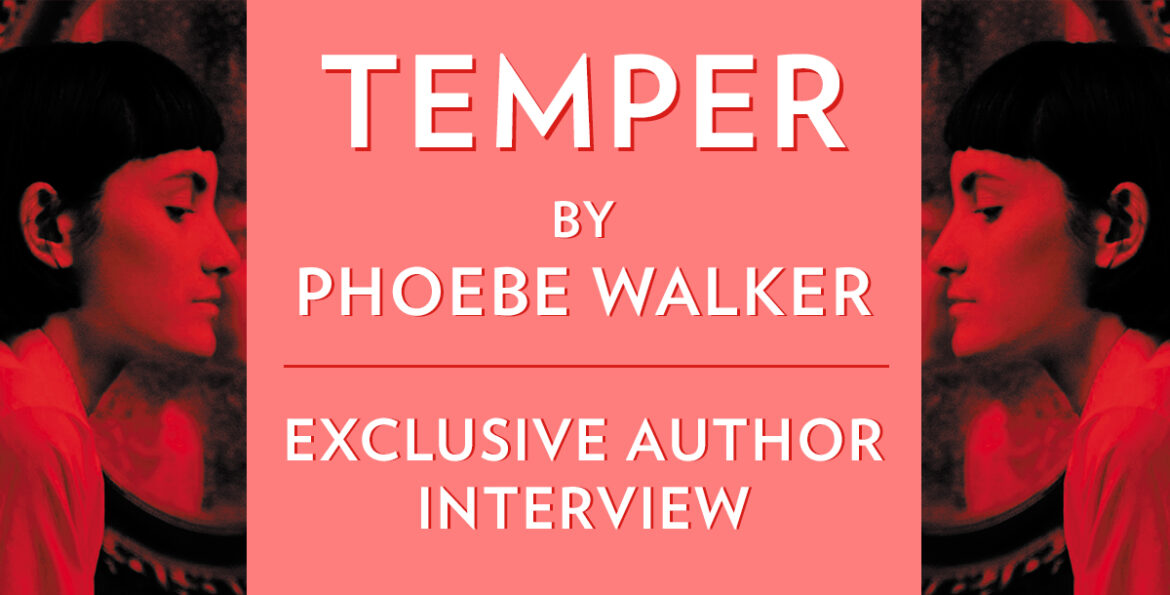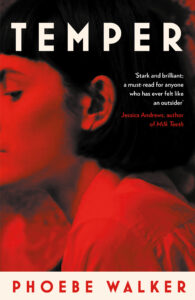

Phoebe Walker: Interview
- 13th April 2023
- Category : Author,Interviews & Blogs
Phoebe Walker is an award-winning poet, who has integrated her poetic and witty style into her debut novel. Set in the Netherlands, Temper deals with contemporary anxieties and explores loneliness, self-worth and disconnection with head-nodding accuracy.
How did you start writing and what does writing mean to you?
Slowly. As a child, I always enjoyed the parts of English lessons where we could write our own stories and poems, and as a teenager I continued to enjoy writing under my own steam. I’ve spent the greater part of my writing life so far on poetry, but I’ve always been quite a sporadic writer – a few weeks or months of industry, interspersed with long, long spells of reading, editing, and thinking; but not writing.
To me, writing is power: the best and most satisfying way to assert agency within my own life, and in the wider world.
Did you always want to be a writer?
Yes, I think so. Reading has always been an intrinsic part of my day to day life, and from a very young age, I thought that being an author – that fine, mysterious force behind the written words – was the most exciting and powerful thing anyone could be.
What inspired you to write Temper?
I started writing what would become Temper during a period when I had, for the first time in several years, some proper time on my hands. I’d just become fully self-employed and, as I was struggling to build a new career as a sole trader and find regular sources of work, I found my weeks sagging a little around patches of unfilled time. Writing regularly was, initially, a way to fill these, and although I’d pretty much only ever written poetry, experimenting with prose – something free-er flowing and longform – seemed a better match for both my mood and the space I had in which to write.
I didn’t set out to write Temper with a fully-formed narrative structure or authorial agenda; it developed day by day as an ever-lengthening piece of prose until eventually I saw that what I was writing was, really, something like a novel, which felt strange initially, because I’d never previously thought of myself as an aspiring novelist.
If you could describe Temper in one word, what would it be?
Unsettled.
In Temper, we see descriptions of urban loneliness, feelings of dislocation and anxieties surrounding increasingly complicated relationships in modern society. Why did you choose to write on these themes?
Because, like very many people I suspect, these are things that I feel, or have felt, particularly as a young adult (and then just plain adult-adult) entering and moving through the contemporary working world.
In what ways do you want the audience to empathise with the character and the themes?
I’m not sure that I necessarily want (or need) readers to empathise with Temper’s narrator; I think there’s lots of ways in which she remains quite a frustrating, remote, character, and I suppose for me that’s partly a symptom of what she’s trying to negotiate – perhaps there’s something sympathetic about that in and of itself.
In terms of the novel’s themes, again I hope there’s much that feels relatable here for readers: moving around, moving to new places, living in cities, starting (and hating) new jobs, forming and leaving friendship groups, trying to build and connect: these are experiences which I think many people share, or remember. In writing about these, I’m trying to articulate things about these common, even banal, experiences, that are (I hope) engaging and provoking.

How would you describe your writing style in Temper and have any author(s) influenced your writing style?
I approached the writing of Temper with my poet’s mindset, initially, which I think shows up in the style: detached, unsettled, focused on details, on crystallizing the moment.
As a reader, I think the style of any author I really enjoy inevitably bleeds into my own writing (usually in poor imitation) for a little while after reading. That means my own overall style is probably a melange of many others I’ve soaked up, or returned to, over the years.
Some stylists I particularly admire include Sybille Bedford, Anita Brookner, Beryl Bainbridge and Penelope Fitzgerald.
As a poet, how did your experience of writing prose differ from your experience of writing poetry?
It’s an obvious thing to say, but the main difference was getting to grips with the time and headspace required to work on a sustained piece of prose and develop a continuous narrative (even a loose one like Temper’s), as opposed to creating a poem, or sequence of poems, where I inhabit the world of the poem very intensely, but for a shorter time.
What do you hope people take away from reading your book?
That life is often a series of unsettling, perturbing, exasperating experiences, and it’s how people negotiate those that’s interesting.
What’s your favourite book and who is your favourite author?
A little while ago I went on the Pause Books podcast, where I had to choose five of my top books. That choice was agonizing enough, so selecting just one is impossible! Books that I love and have returned to frequently over the past few years are: Beyond Black by Hilary Mantel, Ulverton by Adam Thorpe, Angel Pavement by JB Priestley, Slaves of Solitude by Patrick Hamilton. I also love big dynastic novels: Buddenbrooks by Thomas Mann is one of my all-time favourites, and I’ve recently finished The Family Moskat by Isaac Bashevis Singer, which was completely engrossing, as was The Makioka Sisters by Jun’ichirō Tanizaki. In terms of poets, longstanding favourites are Tara Bergin, Hannah Sullivan, Claudia Rankine, and Will Harris. Favourite author? I can’t choose.
Do you have writer’s habit that helps you ‘get in the zone’?
I read a lot, and I think that’s the most important thing for me in helping to maintain a writing mindset: always being preoccupied by words. I find that if I consciously try to create ‘conditions’ for writing, like blocking out a Sunday afternoon when I know I’ll have the house to myself, this never quite works out the way I’d hope.
Do you have a writing schedule?
Not really. If I’m feeling particularly disgusted at my own indolence, I’ll set myself a target (say, 1,000 words a day for six weeks), but I’m very good at scuppering my own best intentions.
Where do you tend to write?
Boringly, at my desk, which is also where I do my day job (I should really aim for greater separation). Often a sentence or an idea occurs to me just as I’m about to fall asleep and, if I’m feeling diligent, I’ll make a note of it on my phone and hope that I remember to look at it when I wake up.
What’s a piece of advice you can give to aspiring authors?
The work has to get to done; beyond that, anything goes.
Temper is out now. Order now from Blackwell’s and Waterstones.
To find out more about Phoebe visit her author page or her website.














